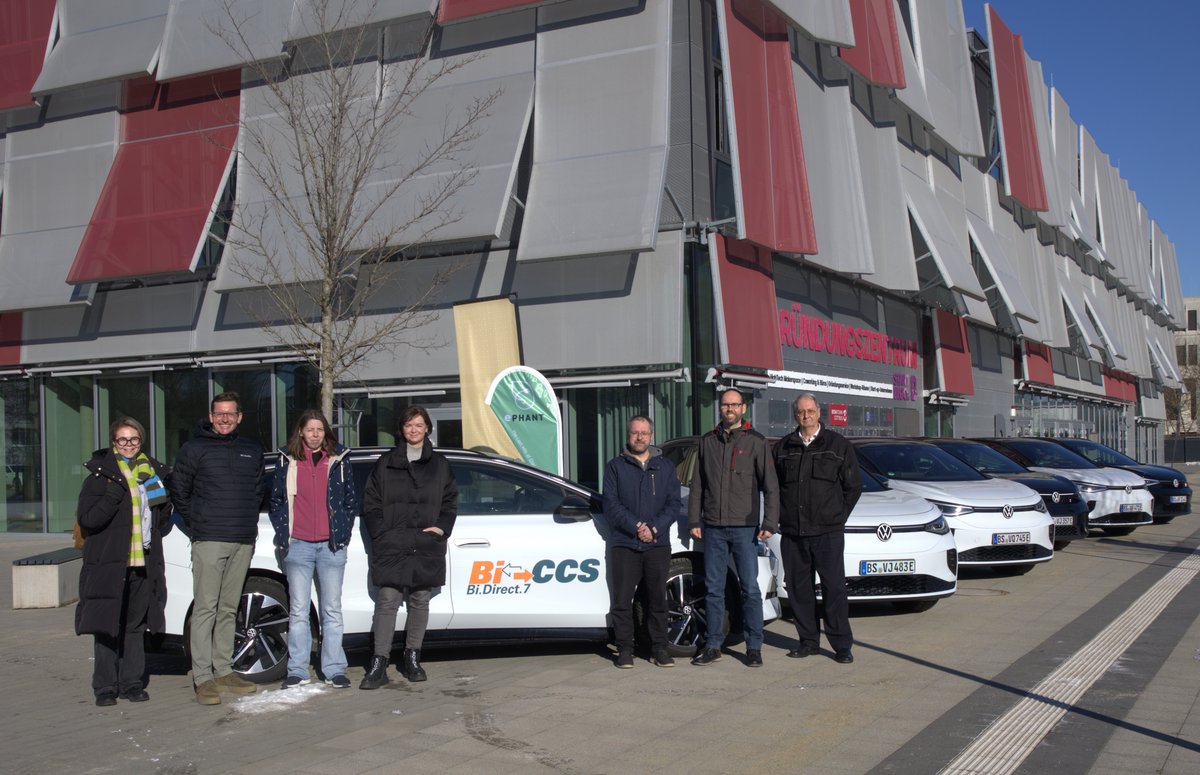Flexible intelligent systems for the success of the energy and mobility transition
One current flagship project is Bi-CCS, the bidirectional charging management system that is intended to enable the integration of electric vehicles into the electricity grids. The development of smart grids plays a central role in the three-year project, which is being funded by the Federal Ministry for Economic Affairs and Climate Protection (BMWK) with more than 4 million euros until October 2026. Bi-CCS aims to use electric vehicles not only as a means of transport, but also as flexible energy storage systems for stabilising electricity grids.
Bi-CCS: electric vehicles as active grid stabilisers
In collaboration with Volkswagen, HagerEnergy and Stromnetz Berlin, an intelligent system is being developed that makes it possible to control energy bidirectionally - i.e. both for charging and for feeding it back into the grid. The CCS (Combined Charging System) charging standard, which is established as the standard for electric vehicles throughout Europe, is being used. Mitteldeutsche Netzgesellschaft Strom, EVTEC and ePHANT have now been won as additional partners for the project.
The centrepiece of the project is the use of electric vehicles as flexible swarm storage units that can not only absorb electricity but also feed it back into the grid. This so-called vehicle-to-grid (V2G) technology offers enormous potential to compensate for grid bottlenecks and fund the integration of renewable energies at the same time. This is particularly relevant for measures to eliminate grid bottlenecks, such as Redispatch 3.0.
Six test vehicles from Volkswagen's ID series as key technology
An application-oriented technology demonstrator is being created at the BTU sites in Cottbus and Senftenberg to enable practical testing of the bidirectional charging infrastructure. Six specially modified Volkswagen vehicles are being used by the team for field tests.
Over the next two years, the prototypes will be tested for their functionality both in everyday use and in specific tests. The scientists are investigating
- How frequent charging and discharging affects battery life.
- How communication between vehicles and the power grid can be made reliable.
- How an intelligent fleet management system can be developed that fulfils grid and user requirements in equal measure.
Test driver training for the e-vehicles
In order to be able to drive the modified vehicles safely, six drivers had to obtain a special prototype driving licence. This demanding training included tests on a proving ground in which the participants had to demonstrate their skills under extreme conditions - such as emergency braking, skidding manoeuvres or controlling the vehicle after a sudden loss of control. This qualification is necessary in order to use the vehicles legally and safely in research and everyday life, as the cars are not authorised for series production due to their modifications.
15 years of expertise in electromobility and smart grids - a model for success
The Bi-CCS project builds on a long tradition of cutting-edge research at BTU Cottbus-Senftenberg. Since 2008, the Chairs of Energy Distribution and High Voltage Engineering and Decentralised Energy Systems have developed pioneering concepts to efficiently integrate renewable energies and electromobility into existing power grids. One outstanding example is the Smart Capital Region 2.0 project, in which a unique research smart grid was created. This combines renewable energy sources, storage systems and cross-sector utilisation and serves as a model for intelligent energy systems.
The collaboration with BMW in the field of bidirectional charging should also be mentioned here. "Between 2021 and 2024, 50 BMW i3s capable of feeding energy back into the grid were tested under real conditions as part of a large-scale field trial. At the same time, a virtually climate-neutral campus model was developed as part of the Smart Campus initiative, which integrates photovoltaic annexes, battery storage and intelligent charging infrastructure to demonstrate sustainable energy use," explains Prof. Dr.-Ing. Harald Schwarz, Emeritus of the Chair of Energy Distribution and High Voltage Engineering at BTU.
Another milestone was the founding of the EXIST-funded start-up ePHANT, which specialises in intelligent charging solutions. This spin-off was created by closely linking research and practice and shows how BTU innovations are actively helping to shape the electromobility transition. The Bi-CCS project builds on this sound experience and takes BTU's research into a new phase - with the aim of linking electromobility and renewable energies even more closely and driving forward the energy and mobility transition.
Technological and social impact
Bi-CCS is a pioneering project that links the energy transition with the mobility transition. The ability to integrate electric vehicles into the power grid as swarm storage can not only reduce grid bottlenecks, but also make the use of renewable energies more efficient. At the same time, vehicle users benefit from an optimised charging infrastructure and additional battery usage options.
With Bi-CCS, BTU Cottbus-Senftenberg is building on its many years of expertise in the fields of smart grids, electromobility and renewable energies. Projects such as Smart Capital Region 2.0, the development of a climate-neutral Smart Campus and bidirectional charging with BMW and Kostal as charging station manufacturers, as well as NISSAN and Delta Electronics from Taiwan, form the basis for these innovative developments. With Bi-CCS, BTU is once again setting standards and driving the transformation towards a sustainable and climate-neutral future.
Funded by the Federal Ministry of Economics and Climate Protection
The project is being funded by the Federal Ministry for Economic Affairs and Climate Protection (BMWK) as part of the "Bidirectional Fleet Power Plants 2025" programme with over 4 million euros from October 2023 to October 2026. This support will make it possible to bring the technology to market maturity by 2026 and demonstrate its practical application on a large scale.
Contact us
Dezentrale Energiesysteme und Elektrische Netze
T +49 (0) 355 69-4044
ahner(at)b-tu.de

